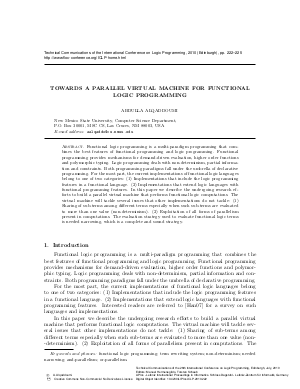Towards a Parallel Virtual Machine for Functional Logic Programming
Author Abdulla Alqaddoumi
-
Part of:
Volume:
Technical Communications of the 26th International Conference on Logic Programming (ICLP 2010)
Part of: Series: Leibniz International Proceedings in Informatics (LIPIcs)
Part of: Conference: International Conference on Logic Programming (ICLP) - License:
 Creative Commons Attribution-NonCommercial-NoDerivs 3.0 Unported license
Creative Commons Attribution-NonCommercial-NoDerivs 3.0 Unported license
- Publication Date: 2010-06-25
File

PDF
LIPIcs.ICLP.2010.222.pdf
- Filesize: 310 kB
- 4 pages
Document Identifiers
Subject Classification
Keywords
- Functional logic programming
- term rewriting system
- non-determinism
- needed narrowing
- and-parallelism
- or-parallelism
Metrics
- Access Statistics
-
Total Accesses (updated on a weekly basis)
0PDF Downloads0Metadata Views
Abstract
Functional logic programming is a multi-paradigm programming that combines the best features of functional programming and logic programming. Functional programming provides mechanisms for demand-driven evaluation, higher order functions and polymorphic typing. Logic programming deals with non-determinism, partial information and constraints. Both programming paradigms fall under the umbrella of declarative programming. For the most part, the current implementations of functional logic languages belong to one of two categories: (1) Implementations that include the logic programming features in a functional language. (2) Implementations that extend logic languages with functional programming features. In this paper we describe the undergoing research efforts to build a parallel virtual machine that performs functional logic computations. The virtual machine will tackle several issues that other implementations do not tackle: (1) Sharing of sub-terms among different terms especially when such sub-terms are evaluated to more than one value (non-determinism). (2) Exploitation of all forms of parallelism present in computations. The evaluation strategy used to evaluate functional logic terms is needed narrowing, which is a complete and sound strategy.
Cite As Get BibTex
Abdulla Alqaddoumi. Towards a Parallel Virtual Machine for Functional Logic Programming. In Technical Communications of the 26th International Conference on Logic Programming. Leibniz International Proceedings in Informatics (LIPIcs), Volume 7, pp. 222-225, Schloss Dagstuhl – Leibniz-Zentrum für Informatik (2010)
https://doi.org/10.4230/LIPIcs.ICLP.2010.222
BibTex
@InProceedings{alqaddoumi:LIPIcs.ICLP.2010.222,
author = {Alqaddoumi, Abdulla},
title = {{Towards a Parallel Virtual Machine for Functional Logic Programming}},
booktitle = {Technical Communications of the 26th International Conference on Logic Programming},
pages = {222--225},
series = {Leibniz International Proceedings in Informatics (LIPIcs)},
ISBN = {978-3-939897-17-0},
ISSN = {1868-8969},
year = {2010},
volume = {7},
editor = {Hermenegildo, Manuel and Schaub, Torsten},
publisher = {Schloss Dagstuhl -- Leibniz-Zentrum f{\"u}r Informatik},
address = {Dagstuhl, Germany},
URL = {https://drops.dagstuhl.de/entities/document/10.4230/LIPIcs.ICLP.2010.222},
URN = {urn:nbn:de:0030-drops-26001},
doi = {10.4230/LIPIcs.ICLP.2010.222},
annote = {Keywords: Functional logic programming, term rewriting system, non-determinism, needed narrowing, and-parallelism, or-parallelism}
}
